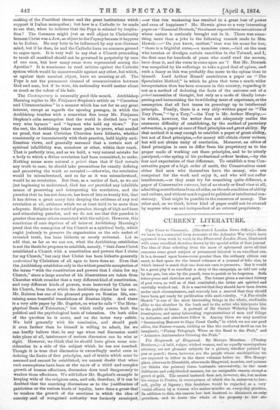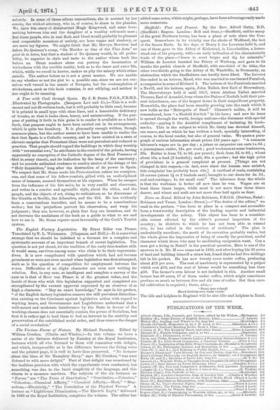The Ringwoods of Ringwood. By Mervyn Merriton. (Tinsley Brothers.)—A bold,
vulgar, wicked woman, and an equally unscrupulous attorney, are not pleasant subjects for a picture, whether painted by pen or pencil ; these, however, are the people whose machinations we are expected to follow in the three volumes before us. Mrs. Honey- glass, afterwards Elsenfeldt, afterwards Ringwood, marries, and poisons (or thinks she poisons) three husbands successively, in the most deliberate and cold-blooded manner, for no assignable reason, except greed of gold. The second husband- does not, however, die, but makes. his escape to France, in consequence of which she is, unknown to her- self, guilty of bigamy ; this doubtless would be regarded as a very venial offence by a. woman who makes murder an every-day practice. In addition to this, she causes her last husband to disinherit an only grandson, and to leave the whole of his property to her ab..
solutely. In some of these odious transactions, she is assisted by her cousin, the wicked attorney, who is, of course, to share in the plunder.
We have the story of disinherited Hugh Ringwood, and some love- making between him and the daughter of a wealthy self-made man ; but these people, who in real flesh and blood would probably be pleasant and respectable members of 'society, are here vague and shadowy, or are mere lay 'figures. We might think that Mr. Mervyn Merriton had taken De Quincey's essay, "On Murder as One of the Fine Arts," au pied de la leitre, but that a student of De Quinoey would, in all proba- bility, be superior in style and taste to the author whose book lies before us. Great masters alone can portray the incarnation of wickedness with the terrible reality, both as to the inner and outer life, which, while we recoil in horror, makes us pity the misery which crime entails. The author before us is not a great master. We are unable to say whether or not the plot he a possible one, since we are not our- selves well versed in the annals of Nowgate, but the contemplation of wickedness,.such as this book contains, is not edifying, and neither is tier ought to be amusing.



































 Previous page
Previous page